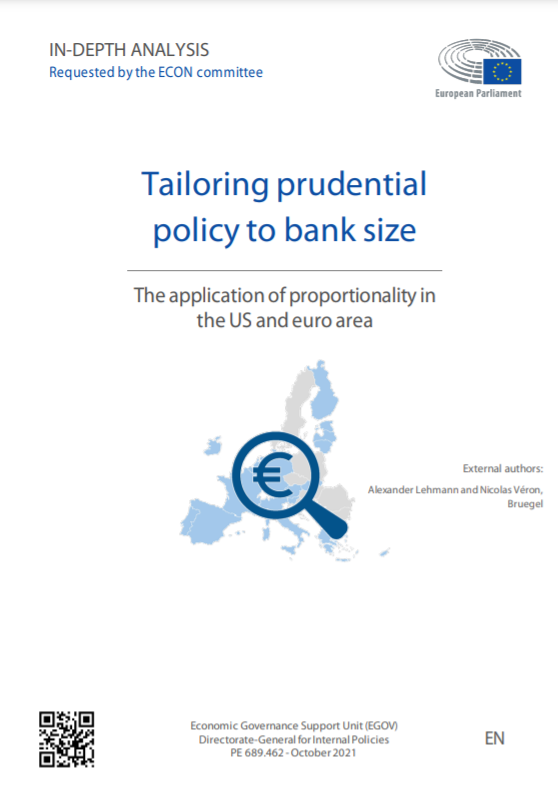Blog Post
All eyes on the Fed
Last week the US Federal Reserve left the federal funds rate unchanged and lowered the interest rate on excess reserves. We review economists’ recent views on the monetary policy conduct and priorities of the United States’ central bank system.
The Federal Open Markets Committee (FOMC) held its third meeting of 2019 last week (April 30th and May 1st). Given the very recent change in monetary policy stance, there was no great anticipation of interest rate changes. However, despite how predictable the conclusions of the FOMC meeting were, the blogosphere still took it as an opportunity to come forth with insights both on the future of the Fed’s monetary policy instruments and on its governance.
A first line of opinions assesses the aftermath of the Fed’s latest dovish turn. Some are sceptical: Tim Duy from FedWatch argues that, while last week’s monetary policy meeting did not yield any fundamental changes, the Fed may soon reverse this path and go back to a hawkish approach. This scenario is not crystal clear – rate hikes are not foreseeable given forecasts of inflation alone, and Fed officials such as Charles Evans and Eric Rosengreen have been vocal about policy strategies allowing for above-target inflation.
Still, Duy lists three scenarios under which a policy reversal – a ‘Dove Trap’, as he calls it – could take place. First, if growth, labour-market and inflation numbers outperform expectations; second, if unemployment numbers are lower than anticipated; third, and last, if the Fed deems that we are too late in the current economic cycle to experiment with persistently above-target inflation, leaving changes in the Fed’s policy strategy for the next cycle. “Any talk of catch-up strategies in which the Fed makes up for low inflation by targeting higher inflation, for example, may only be in preparation for the next recession. In that case, it has little if any relevance for the near-term outlook.”
Others, such as Christophe Donay from Pictet, take a more upbeat stance. Donay points out that the Fed’s dovish turn and the promise “to be patient on further rate hikes” has helped markets in the beginning of the year. Signals that the end of balance-sheet reductions is near have calmed market concerns about the prospect of tightening financial conditions. Donay wonders whether this turn also means a turn of the page in central-bank policymaking – the low interest rates and the end of the economic cycle will force central banks to be creative in the event of a downturn.
Indeed, some have already started questioning the instruments that the Federal Reserve has at its disposal to manage the economy. While the Fed has so far mostly relied on the federal funds rate, Bill Dudley, former president of the Federal Reserve Bank of New York, writes that this target has “outlived its usefulness”. As a result of quantitative easing, he explains, banks have accumulated reserves that in turn reduce their need of borrowing or lending federal funds. As a consequence, the interest rate on reserves “has become the Fed’s most effective tool of monetary policy, putting a floor under the interest rates at which banks are willing to lend”. Dropping the federal funds target and focusing solely on the interest rate paid on reserves, Dudley argues, “would have no meaningful effect on the Fed’s monetary policy stance” and would simplify policies by “eliminating the need for technical adjustments to the interest rate on reserves to ensure that the federal funds rate stays within its range”.
Currently the Fed operates monetary policy in what is called a “floor system”, whereby the target interest rate is equal or very close to the interest rate on excess reserves (IOER). David Beckworth, from MacroMusings, argues that this could soon enough turn into a “corridor system”, where the overnight interest rate is above the IOER. This transition from floor to corridor could be caused by a large shift in the demand for reserves, moving the Fed off “the perfectly elastic or ‘flat’ portion of the bank reserve demand curve”. The shift could happen with or without a significant reduction in the supply of reserves. “The Fed, in other words, could have a relatively large balance sheet and still end up in a corridor operating system.”
With regard to governance, Dudley highlights it as an impediment to the change in interest-rate priorities. More precisely, the future of the Board of Governors has also been a heated theme. Tyler Cowen from the Marginal Revolution drafts a supermarket list for the attributes of an ideal candidate: a record of practical managerial experience, a reasonable diplomat with some “measure of gravitas”, “high credibility with other Fed board members, most of all the chair”, “strong political skills” given the several interactions with the media, and – not least important – “well-informed views, however you might define them, on monetary policy and regulation”.
Scott Sumner from The Money Illusion weighs in and adds personal integrity to the list, but also vouches for a more decentralised Fed. In his view, a committee composed entirely of experts on monetary policy and another committee of experts on bank regulation “would allow more weight to be placed on expertise for monetary policymakers, and relatively less weight on managerial skills”.
Gregory Mankiw boils down the past success of the Fed “as a public institution” to two ingredients – first, its nonpartisan and widely shared mandate and objectives; second, the quality of their human resources, ranging from their research assistants to the board of governors. The latter group typically possesses either “proven expertise as an economist or substantial experience working in the financial sector” and is appointed for 14-year terms, a long enough term that is meant to keep the governors independent from political pressures.
Mankiw says nominees of the likes of Cain and Moore to the Fed Board are “simply not qualified” and he was “hoping that the Senate will reject them if they are nominated”. Krugman also expresses reservations with regard to Moore, and remarks that his past evaluations of the Fed’s policy, which have “always been wrong”, have gone unquestioned by the Republican senators so far. Both the candidates have since withdrawn.
Republishing and referencing
Bruegel considers itself a public good and takes no institutional standpoint. Anyone is free to republish and/or quote this post without prior consent. Please provide a full reference, clearly stating Bruegel and the relevant author as the source, and include a prominent hyperlink to the original post.










